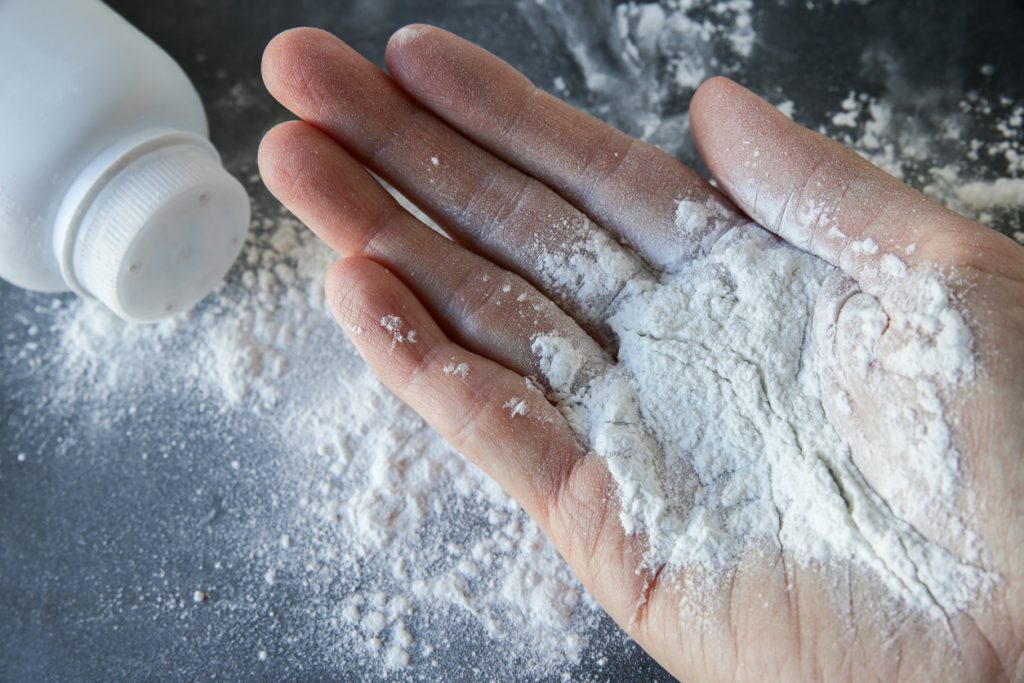Talc

What is Talc?
Talc (hua shi, 滑石), a naturally occurring mineral mined from the Earth, is composed of Magnesium, Silicon, Oxygen and Hydrogen. Today, France is the world’s largest supplier of mined Talc.
Talc is used to make paper, plastic, paint, rubber and pharmaceuticals. Talc can also be used to make Talcum powder, the ingredient used in baby powder and many cosmetics. Being a powder, Talc is good at absorbing and reducing friction, making it a good choice for keeping skin dry and preventing rashes.
In China, Talc is a popular remedy for diarrhoea, eczema, and conditions of painful or difficult urination. It is believed that Talc is able to do this by alleviating water retention.
In Traditional Chinese Medicine (TCM), Talc falls under the category of ‘Herbs that drain Dampness’. A diuretic, Talc can promote an increased production of urine in order to remove Dampness accumulated in the body. According to TCM, Dampness accumulates first in the lower limbs, causing edema and impaired movement. From there, if unchecked, it can move upwards to impair digestion and the respiratory system.
Cold in nature, Talc can help individuals who have too much Heat in their body, such as those experiencing a Yang Excess or a Yin Deficiency, to restore a harmonious yin-yang balance. Sweet in taste, Talc can slow down acute reactions, detoxify the body and has a tonic effect by replenishing qi and blood. In particular, it targets the bladder and the stomach.
Functions and Benefits of Talc
Traditional Chinese Medicine (TCM) shows that Talc has the following health benefits.
Talc can induce diuresis to treat Stranguria. As Talc has draining properties, it can clear Damp-Heat in the bladder to regulate water movements. Thus, the herb can treat symptoms such as urinary tract infections. Also, Talc can clear Heat, especially summer Heat, to treat symptoms such as restlessness, palpitations, thirst, as well as scanty and dark urine caused by Summer Heat. The herb is also combined with other Dampness-resolving and Lung qi-ventilating herbs to treat headache, chill, heavy sensation of body and chest oppression. Talc is indicated for diarrhoea caused by Damp-Heat too.
As Talc can clear Heat and dispel Dampness, Talc can promote wound healing and relieve itching when applied externally. For eczema, Talc can be used alone or ground into powder with Ku Fan and Huang Bai. For miliaria, Talc is usually combined with Herba Benthae (Bo He) and Licorice Root (Gan Cao) to be ground into powder for external application. Other skin conditions that Talc can relieve include sores and heat rash.
Modern studies have shown that Talc can absorb moisture from the skin to make it smooth. It may in turn help to reduce sweat production and the risk of fungal infections. Talcum powder is also a great antiperspirant, as it helps to absorb the excess perspiration that we experience during Summer. It keeps your skin dry, calm and cool. Talc powder also works as a dry shampoo. If your hair becomes oily, you can sprinkle some Talc powder on the roots of your hair as a quick remedy.
Other than the above Talc powder uses, Talc powder can also be used on bedsheets to make it softer and reduce the risk of them causing skin irritation.
How to Use Talc
The exact dosage of Talc depends on the method of usage and the condition that you are attempting to treat.
You can find Talc as an ingredient in many cosmetic or body products such as baby powder and concealer.
You can also apply Talcum powder to your skin to reduce friction and perspiration.
However, if you are patting Talc powder on your skin, use it sparingly. Do not cake it on your body in thick layers as it may cause excessive absorption and deprive your skin of hydration.
Also, shake Talc powder out in small doses. Do not shake a lot out at once as it may introduce Talcum spores into the air, which may cause respiratory distress.
While food grade Talc can be found in supplements after professional processing, do not attempt to ingest Talc or Talcum powder directly as it may cause eating disorders.

Cautions and Side Effects of Talc
Talc should not be used when you are not experiencing symptoms or conditions caused by Damp Heat. Also, pregnant individuals should avoid using Talc for the time being. In addition, individuals experiencing Spleen Qi Deficiency, spermatorrhea or polyuria should avoid Talc too.
It is important that you should not inject or inhale Talc at all times.
There were reports that Talc may be associated with ovarian cancer. However, there is no concrete evidence to support this claim yet.
On the other hand, clinical experience has confirmed that Talc may cause granulomas in the rectum, vagina or wounds. Therefore, long-term usage of Talc is not recommended.
Prolonged use of Talc powder may also reduce the production of natural oils in the skin. This would make the skin dry and lead to problems such as flaky skin and sensitive skin.
Summary
Here is a summary for Talc:
- Herb name (Chinese): 滑石
- Herb name (Pin Yin): huá shí
- Herb name (English): Talc
- Herb name (Botanical): Talcum
- Origin of species: Hydrated magnesium silicate
- Part(s) of herb used: Mineral
- Geo-specific habitat(s): Shandong, Jiangxi, Shanxi, Liaoning
- Taste(s) & Properties: Sweet, bland; Cold; Administrates the Bladder, Lung and Stomach Meridians
- Actions: Eases symptoms of difficult or painful urination; Relieves symptoms related to heat stroke and skin irritations
References
Dawoodbhai, S., & Rhodes, C. T. (1990). Pharmaceutical and cosmetic uses of talc. Drug development and industrial pharmacy, 16(16), 2409-2429. [Accessed on 18th November 2022]
McCarthy, E. F., & Updated by Staff. (2000). Talc. Kirk‐Othmer Encyclopedia of Chemical Technology, 1-10.[Accessed on 18th November 2022]
Sinniah, D. (2011). Industry and cosmetic uses of talc with their implication on health. IeJSME, 5(1), 10-16.[Accessed on 18th November 2022]
Share this article on
